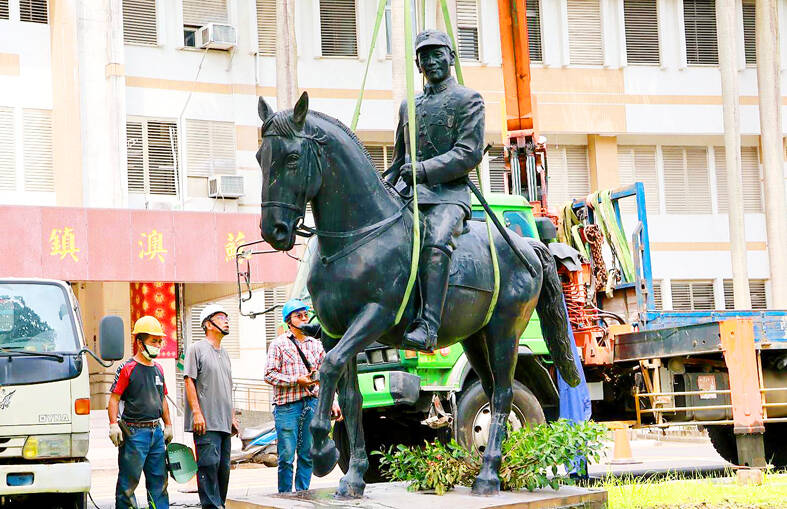The Ministry of National Defense and subordinate units have resisted the government’s attempts to remove symbols of Taiwan’s authoritarian past, despite state subsidies for the task, Executive Yuan officials told a meeting of the Internal Administration Committee at the legislature in Taipei on Monday.
Democratic Progressive Party (DPP) Legislator Huang Jie (黃捷) accused the Cabinet of inaction on a mandate to remove statues of and memorials to Chiang Kai-shek (蔣介石) from public spaces.
The government provides up to NT$100,000 per case for labor and other expenses to remove such items, but progress is lacking, Huang said, adding that only 165 of the 934 listed Chiang statues in public spaces had been removed, or less than 20 percent.

Photo courtesy of a reader
“The Executive Yuan should be more proactive on this matter and should make a decision on the fate of Chiang Kai-shek Memorial Hall,” she said.
She also referenced the work of Chen Chu (陳菊) of the DPP in her time as Kaohsiung mayor.
“Chen in 2007 made changes to the city’s Chiang Kai-shek Culture Center, renaming it the Kaohsiung Cultural Center, and removed Chiang’s statue from the site,” Huang said. “Kaohsiung did it 17 years ago ... while nothing has been done at Chiang Kai-shek Memorial Hall in Taipei to this day.”
The Executive Yuan’s Department of Human Rights and Transitional Justice said that a special task force has been set up under the supervision of the vice premier to plan and gather feedback regarding the Taipei site.
However, the task force has received mixed opinions from the public on whether to dismantle the hall or allow it to remain with changes to highlight transitional justice, department Deputy Director-General Shih Pu (石樸) said.
“One main area of resistance is from the defense ministry, as its units say they need discipline and leadership to supervise troops,” Shih said. “The ministry has said it needs to take into account military tradition.”
The minister of national defense last week said it was a military tradition to honor Chiang, who founded its training academies in China and Taiwan, adding that he considered military sites to be private property, the South China Morning Post reported.
Huang said that Chiang’s status must be removed from the Taipei site, including the military police unit that provides protection services for the memorial, with daily changings of the guard.
“Now that the government has declared May 19 to be White Terror Memorial Day, we must race against time for transitional justice and pick up the pace on the decision of what to do with the Chiang memorial in Taipei,” Huang said.
DPP Legislator Chang Hung-lu (張宏陸) said that action needs to be accelerated to recover “ill-gotten party assets” and put them to proper use, especially for transitional justice, and to provide compensation for people affected by the White Terror and the families of those who died.
Additional reporting by the Guardian

Chinese Nationalist Party (KMT) Chairman Eric Chu (朱立倫), spokeswoman Yang Chih-yu (楊智伃) and Legislator Hsieh Lung-chieh (謝龍介) would be summoned by police for questioning for leading an illegal assembly on Thursday evening last week, Minister of the Interior Liu Shyh-fang (劉世芳) said today. The three KMT officials led an assembly outside the Taipei City Prosecutors’ Office, a restricted area where public assembly is not allowed, protesting the questioning of several KMT staff and searches of KMT headquarters and offices in a recall petition forgery case. Chu, Yang and Hsieh are all suspected of contravening the Assembly and Parade Act (集會遊行法) by holding

PRAISE: Japanese visitor Takashi Kubota said the Taiwanese temple architecture images showcased in the AI Art Gallery were the most impressive displays he saw Taiwan does not have an official pavilion at the World Expo in Osaka, Japan, because of its diplomatic predicament, but the government-backed Tech World pavilion is drawing interest with its unique recreations of works by Taiwanese artists. The pavilion features an artificial intelligence (AI)-based art gallery showcasing works of famous Taiwanese artists from the Japanese colonial period using innovative technologies. Among its main simulated displays are Eastern gouache paintings by Chen Chin (陳進), Lin Yu-shan (林玉山) and Kuo Hsueh-hu (郭雪湖), who were the three young Taiwanese painters selected for the East Asian Painting exhibition in 1927. Gouache is a water-based

Taiwan would welcome the return of Honduras as a diplomatic ally if its next president decides to make such a move, Minister of Foreign Affairs Lin Chia-lung (林佳龍) said yesterday. “Of course, we would welcome Honduras if they want to restore diplomatic ties with Taiwan after their elections,” Lin said at a meeting of the legislature’s Foreign Affairs and National Defense Committee, when asked to comment on statements made by two of the three Honduran presidential candidates during the presidential campaign in the Central American country. Taiwan is paying close attention to the region as a whole in the wake of a

OFF-TARGET: More than 30,000 participants were expected to take part in the Games next month, but only 6,550 foreign and 19,400 Taiwanese athletes have registered Taipei city councilors yesterday blasted the organizers of next month’s World Masters Games over sudden timetable and venue changes, which they said have caused thousands of participants to back out of the international sporting event, among other organizational issues. They also cited visa delays and political interference by China as reasons many foreign athletes are requesting refunds for the event, to be held from May 17 to 30. Jointly organized by the Taipei and New Taipei City governments, the games have been rocked by numerous controversies since preparations began in 2020. Taipei City Councilor Lin Yen-feng (林延鳳) said yesterday that new measures by